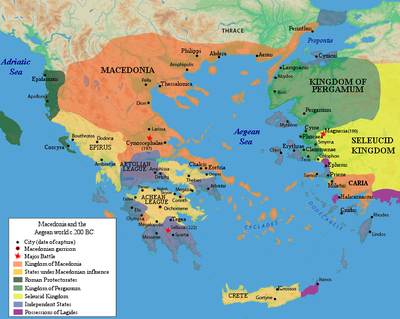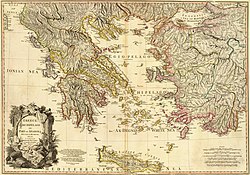This article includes a list of general references, but it lacks sufficient corresponding inline citations. (February 2023) |

| History of Greece |
|---|
 |
|
|
Hellenistic Greece is the historical period of Ancient Greece following Classical Greece and between the death of Alexander the Great in 323 BC and the annexation of the classical Greek Achaean League heartlands by the Roman Republic. This culminated at the Battle of Corinth in 146 BC, a crushing Roman victory in the Peloponnese that led to the destruction of Corinth and ushered in the period of Roman Greece. Hellenistic Greece's definitive end was with the Battle of Actium in 31 BC, when the future emperor Augustus defeated Greek Ptolemaic queen Cleopatra VII and Mark Antony, the next year taking over Alexandria, the last great center of Hellenistic Greece.[1]
The Hellenistic period began with the wars of the Diadochi, armed contests among the former generals of Alexander the Great to carve up his empire in Europe, Asia, and North Africa. The wars lasted until 275 BC, witnessing the fall of both the Argead and Antipatrid dynasties of Macedonia in favor of the Antigonid dynasty. The era was also marked by successive wars between the Kingdom of Macedonia and its allies against the Aetolian League, Achaean League, and the city-state of Sparta.
During the reign of Philip V of Macedon (r. 221–179 BC), the Macedonians not only lost the Cretan War (205–200 BC) to an alliance led by Rhodes, but their erstwhile alliance with Hannibal of Carthage also entangled them in the First and Second Macedonian War with ancient Rome. The perceived weakness of Macedonia in the aftermath of these conflicts encouraged Antiochus III the Great of the Seleucid Empire to invade mainland Greece, yet his defeat by the Romans at Thermopylae in 191 BC and Magnesia in 190 BC secured Rome's position as the leading military power in the region. Within roughly two decades after conquering Macedonia in 168 BC and Epirus in 167 BC, the Romans would eventually control the whole of Greece.
During the Hellenistic period the importance of Greece proper within the Greek-speaking world declined sharply. The great centers of Hellenistic culture were Alexandria and Antioch, capitals of Ptolemaic Egypt and Seleucid Syria respectively. Cities such as Pergamon, Ephesus, Rhodes and Seleucia were also important, and increasing urbanisation of the Eastern Mediterranean was characteristic of the time.
- ^ Ferguson, John (2024). "Hellenistic Age". Encyclopædia Britannica. Archived from the original on 14 May 2013. Retrieved 21 June 2022.
{{cite encyclopedia}}: CS1 maint: bot: original URL status unknown (link)